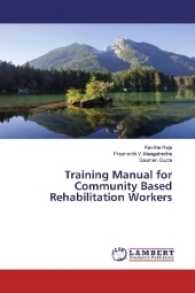Full Description
Transforming Education for Social Justice: Empirical Insights from Leadership, Equity, and Research in Action is a powerful anthology that brings together a collection of articles originally published in the Journal of Leadership, Equity, and Research (JLER). These chapters reflect a shared commitment to confronting systemic inequities and transforming PreK-12 and higher education through critical scholarship, equity-minded leadership, and community collaboration. As part of the Myers Education Press Ethnic Studies Revival Series, this volume is organized around three central themes:
the role of educational leadership and transformative research for education reform and student empowerment,
countering inequitable disciplinary practices through alternative and transformative approaches,
the importance of student voice and activism for promoting equity and social justice.
Together, these themes offer a framework for reimagining schools as spaces of resistance, healing, and liberation. In an era marked by heightened attacks on ethnic studies and diversity initiatives, Transforming Education for Social Justice offers timely empirical insights that support inclusive, justice-centered educational practices. The chapters draw on culturally responsive pedagogy, restorative justice, critical race theory, and decolonial frameworks to provide both a critique of existing structures and a vision for what is possible. This volume is an essential resource for scholars, educators, and policymakers committed to equity and social transformation. It is especially well-suited for use in Ethnic Studies, Educational Leadership, Teacher Preparation, and Social Justice Education courses.
Contents
Series Foreword — Mahmoud Suleiman and Gilberto Q. Conchas
Introduction: Transforming Education for Social Justice: Empirical Insights from Leadership, Equity, and Research in Action —Victor DeAlba, Gilberto Q. Conchas, and Mahmoud Suleiman
Chapter 1: Advancing Equity to Improve Academic Achievement of Students Living in Poverty Using Transformative Practices —Kitty Fortner and Jose Lalas
Chapter 2: Transforming Education: Integrating the Wise Compassionate Framework, Health, and Community for Holistic Student Development —Felipe Mercado
Chapter 3: From Vision to Practice: Staff Leaders Enacting Servingness in Mentoring Programs —Rebecca Covarrubias, Giselle Laiduc, Katherine Quinteros, and Joseline Arreaga
Chapter 4: The Differential Attainment Rate Among First-Generation Students: A Comparative Analysis of Recent Trends in Educational Achievements —Enrique S. Pumar
Chapter 5: Is Structural Change "Practical"? Latino Boys & Imagining Otherwise —Omar Davila Jr.
Chapter 6: Black Girls and School Discipline: Shifting from the Narrow Zone of Zero Tolerance to a Wide Region of Restorative Practices and Culturally Proficient Partnerships —Angela Clark-Louque and Talisa A. Sullivan
Chapter 7: "I Was Pushed Out of School": Social and Emotional Approaches to a Youth Promotion Program —Rebeca Mireles-Rios, Victor M. Rios, Trevor Auldridge-Reveles, Marilyn Monroy Castro, and Isaac Castro
Chapter 8: Administrator and Teacher Experiences Implementing Restorative Practices: A Phenomenological Study —Lervan Atticot and Brandy Kamm
Chapter 9: Accelerate Ethnic Studies with "All Deliberate Speed!" —Talisa Sullivan and Peter Flores
Chapter 10: Educational Persistence in the Face of Violence: Narrative from Resilient Latino Boys —Adrian H. Huerta and Maritza E. Salazar
Chapter 11: From Ally to Activist: Embracing Activism as an Essential Component of Social Justice Educational Leadership to Combat Injustice in American Schools —Michael L. McIntosh
Chapter 12: The Effects of School Belonging and Peer Influences on the Achievement of High School Immigrant Students —Arnold Sánchez Ordaz and Eduardo Mosqueda
Chapter 13: "It's Like Where Do I Belong?": Latinx Undocumented Youth Activism, Identity, and Belonging in North Carolina —Felicia Arriaga and Sophia Rodriguez
Chapter 14: Ignite The Leader Within: Virtual Latinx Youth Empowerment and Community Leadership Amid COVID-19 —Pablo Montes, Monica Bourommavong, Judith Landeros, Luis Urrieta, Jr., and Courtney Robinson
Chapter 15: Perceptions of Inequality as Racial Projects: Uncovering Ethnoracial and Gendered Patterns Among First-Generation College-Going Asian American Students —Gilberto Q. Conchas, Socorro Cambero, Vanessa Delgado, Jess Lee, and Leticia Oseguera
About the Contributors
Index






